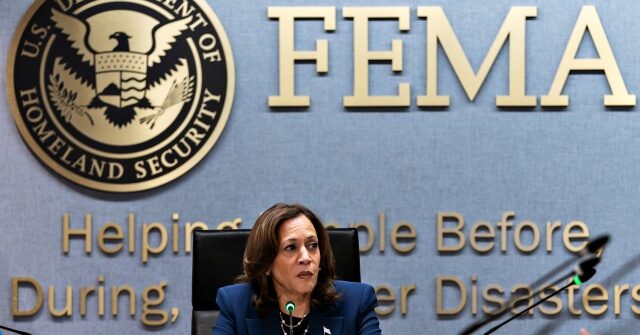Recent discussions surrounding FEMA’s response to Hurricane Helene have ignited a partisan controversy, with Democrats and certain media outlets blaming Republicans for the agency’s perceived shortcomings. Democrats, particularly the Kamala Harris campaign, have criticized Republicans for voting against a September spending bill that included funding for FEMA. This bill was designed to cover numerous federal projects, which many Republicans oppose as excessive and aligned with agendas they deem detrimental to the economy. They argue that the bill’s broad inclusion of so-called “woke” initiatives distracts from critical disaster relief efforts.
Despite these claims, FEMA Administrator Deanne Criswell has clearly stated that the agency possesses sufficient funding to manage recovery efforts from both Hurricanes Helene and Milton. Her assertion has not deterred Democratic critics from seizing the opportunity to politicize the situation, with the Harris campaign sharing a misleading claim suggesting that voting against the September bill correlates with a lack of concern for disaster relief. Their argument conveniently overlooks the broader context of why many Republicans opposed the legislation’s extensive allocations, which included initiatives perceived as leftist or wasteful.
Opposition to the September funding bill was multifaceted, with conservative lawmakers voicing concerns related to its fiscal priorities. Critics highlighted the inclusion of significant funding for initiatives related to diversity, equity, and inclusion (DEI), with some calling it a financial overreach. The Democratic-backed bill also allocated billions to nonprofits accused of facilitating illegal immigration, as well as urban infrastructure projects that many Republicans believe favor liberal-leaning metropolitan areas while neglecting rural needs. Such allocations have fueled Republican claims that the bill is more about further left-wing agendas than responsible governance.
In addition to domestic concerns, the bill prompted backlash for its robust foreign aid provisions, which opponents argue fund progressive initiatives overseas. Many Republicans are troubled by the implications of extending government funding during the lame duck session, concerned this allows Democrats to sidestep voter accountability prior to the formation of a new Congress. This scenario could enable a large omnibus spending bill to pass without recently elected representatives participating in negotiations, raising significant alarms regarding fiscal responsibility and democratic integrity.
Efforts by some Republicans to leverage the September funding deadline were thwarted, as proposed shifts toward longer-term resolutions, such as pairing a six-month continuing resolution (CR) with border security measures or noncitizen voting regulations, failed to gain momentum in Congress. Ultimately, these factions could not overcome the Democratic majority in the Senate, leading to the swift passage of the CR that many Republicans opposed but chose not to delay further in an election-year climate dominated by campaigning priorities.
FEMA’s longstanding reputation as a focal point of congressional scrutiny persists, largely due to historical mismanagement during disasters, notably Hurricane Katrina. The agency’s actions during Hurricane Helene are expected to remain a topic of discussion and criticism for years, particularly as costs and responses expand. Amidst these politicized discussions, it is anticipated that Democrats and media will continue attributing responsibility for any missteps to Republican opposition, indicating that this narrative could dominate the fallout from Hurricane Helene as it unfolds in the coming months.

